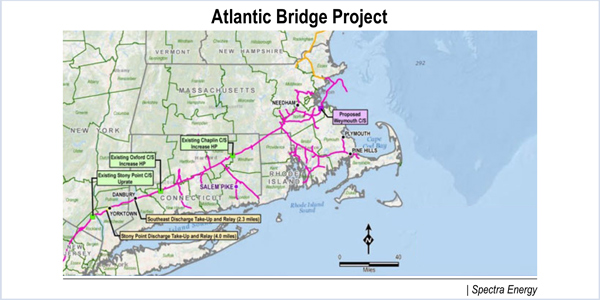By William Opalka
FERC on Wednesday approved the Atlantic Bridge Project, which will expand natural gas delivery capacity in New York and New England (CP16-9).
In issuing a certificate of public convenience and necessity for the project, the commission accepted an environmental assessment released last spring that found “no significant impact.” (See Atlantic Bridge Environmental Assessment Released.)
“We agree with the conclusions presented in the EA and find that the project, if constructed and operated as described in the EA, and in compliance with the environmental conditions in the appendix to this order, does not constitute a major federal action significantly affecting the quality of the human environment,” FERC wrote.
The project will expand Spectra Energy’s Algonquin Gas Transmission and Maritimes & Northeast Pipeline systems by 132,700 dekatherms/day to serve the New England and Canadian natural gas markets.
The $452 million project would replace existing pipelines and add new or expand existing compressor stations in New York, Connecticut and Massachusetts.
Six miles of existing pipeline in New York and Connecticut would be increased from 26 inches to 42 inches. A 7,700-horsepower compressor station would be built in Weymouth, Mass., along with numerous infrastructure improvements.
The commission said “the vast majority” of public comments concerned the Weymouth station, but it said that facility did not require an additional environmental impact statement. Concerns were adequately addressed by conditions set out in the order, it said.
FERC turned aside opponents’ claims that excess project capacity will be used to export LNG outside of North America.
“We note that while there are currently several proposals to export liquefied natural gas from the United States and Canada to overseas countries, there is no evidence that the applicants are constructing the Atlantic Bridge Project for this purpose. The project shippers receiving gas in Canada are industrial and commercial users of natural gas within Canada, not companies involved in the export of LNG,” the commission wrote. “We also note the commission does not have jurisdiction over the export or import of natural gas as a commodity. Such jurisdiction resides with the U.S. Department of Energy (DOE), which must act on any applications for natural gas export and import authority. Thus, the issue of whether the export of LNG will cause economic harm is beyond the commission’s purview.”
Spectra said the pipelines’ capacity was fully subscribed by five local distribution companies, two manufacturers and a municipal utility during its open season in 2014 and 2015.
The expansion project has a proposed in-service date of November 2017.




